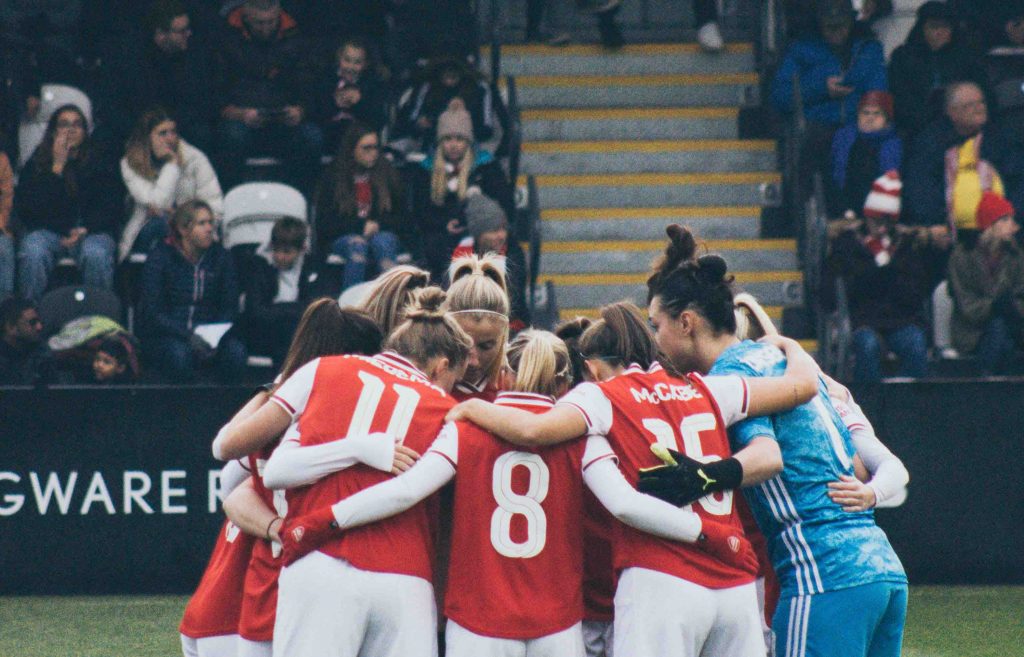“It’s a Fantastic Place to be,” The Almost Football Utopia

Women’s football is in a healthy state in contrast to the men’s football industry; it is not driven by a ‘the bigger the better’ money hungry mentality. The FA Women’s Super League and FA Women’s Championship players still have a raw connection to the game and the interaction between clubs and fans is still a relationship of close collaboration and commitment.
Fans are still able to interact with players with just a thin advertisement board between them after every match and spectators are still able to see the scar on Danielle Van de Donk’s knee from their Borehamwood seats.
The steady development of women’s football has notably been an overall success and like everything else, it hasn’t been perfect.
But a big downfall in wanting to grow the women’s game is using the men’s game as the ultimate goal. The women’s league should not strive to be everything the men’s game is, being like the men is not the only way to be successful.
Men’s football is not the standard of the sport nor is it an exception. Do not compare men’s elite football to women’s elite football.
Women’s football and men’s football are simply football.
The problems related with the women’s game are about the simple standards of being professional athletes. These women don’t want a staggering number of zeros on their paycheques.
They want to be respected as good footballers. They want fans based on their performances on the pitch rather than their social media trends.
Jordan Nobbs was clear on how important it is for her to perform as a footballer for the fans, she simplified the concept of how close women’s football is with their fans and how significant it is to have an audience who appreciates footballers because of what they do on the pitch.
“I think we are there to perform and entertain on the pitch, score goals and play well,” said Nobbs.
“But I think when it comes to the fans, I think we just appreciate and hope that everyone enjoys watching us. It’s our duty to be good role models on the pitch but also to get fans and support so we can fill stadiums and fill Borehamwood however that may be.
“Hopefully we just keep the fans coming back.”
The WSL and Championship have previously been playing catch up with the top leagues, but English football is now levelled with the best and if anything, has now become the best, but there is still a lot to be done.
The growth of these leagues has been a slow and steady process, but if it’s rushed, then its success may decline as fast as that of VAR.
The topic of playing at Premier League stadiums week in week out emerges every occasion possible. This will not help development, nor will increasing the high-end players’ salary while the lower-end players still have to hold a second job to support themselves.
There is more to be worked on within the league and within the nation before the WSL can take the big leap of booking bigger stadiums. At the moment, it might be too premature and would potentially harm the progress seen in women’s football rather than help it.
Stadiums on regular matchdays are usually not sold out, with the lowest average attendance of the 2018/19 season being under 1,000 people. Clubs with low attendances, and even those with the highest, cannot afford to rush into going stadiums with 20,000+ capacity.
“I think on the odd occasion it’s great for set experience and it shows the numbers that we have been getting but I think that we need to stay in the place that women’s game is at right now,” said Nobbs.
“It’s a a fantastic place to be and hopefully keeps growing and we can gain that [playing in bigger stadiums] over time.
“We just need to keep pushing in all areas we can, but I think we need to do it in the right way. Make sure that we keep progressing at the right pace.”
Yes, teams will need better stadiums soon, yes players will hopefully get a higher average of income soon, and yes hopefully these leagues will be rightfully respected as the highest level of women’s football.
But until then, everything seems to be where it needs to be, and there is consistent development towards better standards for clubs, players and fans and that should not be overlooked.